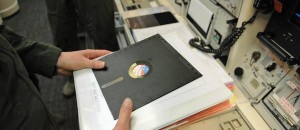 Did you think facial recognition software in the hands of law enforcement is only something in the movies? Well, to an extent, it really is something only in movies. However, with the FBI’s $1 billion Next Generation Identification program, this will change and it will change as soon as 2014.
Did you think facial recognition software in the hands of law enforcement is only something in the movies? Well, to an extent, it really is something only in movies. However, with the FBI’s $1 billion Next Generation Identification program, this will change and it will change as soon as 2014.
The FBI’s Next Generation Identification (NGI) program is a project that aims to better deal with crime by storing biometrics of criminals in an American national database. The NGI plans on using a variety of tools to better identify criminals, with one of the biggest ones being facial recognition while others include voice identification, DNA analysis, and iris scans.
The purpose behind using facial recognition in the NGI is two-fold. The FBI wants to be able to identify criminals from a large crowd using facial recognition and, conversely, be able to identify criminals from still photos by running their photos through NGI’s database. Of course for NGI to be successful there needs to be input of facial data into the database. The FBI is accomplishing this flow of information by using mugshots but also by partnering with driver license issuing state agencies and using driver license photos.
While the FBI has not gone public with what software and algorithms they are using for NGI, a study conducted in 2010 shows that the system has a 92% accuracy in picking out a person from 1.6 million mugshots. And, as shown by Marios Savvides’s lab at Carnegie Mellon, the technology is here to be able to identify people who aren’t even looking directly at a camera (i.e. side shots of faces).
Conspiracy theories aside, the NGI is aimed at criminals and not for general purpose surveillance. As the NewScientist points out, in July 2012 the FBI’s Jerome Pender told a Senate hearing that a pilot program of NGI used a searchable photo database that included only mugshots of known criminals. However, there are bound to be privacy concerns with this type of thing and rightly so; as attorney Jennifer Lynch of the Electronic Frontier Foundation points out, “it’s unclear from the NGI’s privacy statement whether that [criminal mugshots only] will remain the case once the entire system is up and running or if civilian photos might be added”. The American Civil Liberties Union (ACLU) isn’t exactly receptive of the NGI either. Jay Stanley the ACLU cautions that “once you start plugging this [driver license photos] into the FBI database, it becomes tantamount to a national photographic database”.
The NGI is currently being tested in limit piloted studies in the United States. The FBI plans on rolling out nationwide by 2014. Come 2014, all your faces are belong to them.
[via NewScientist]

 Email article
Email article



